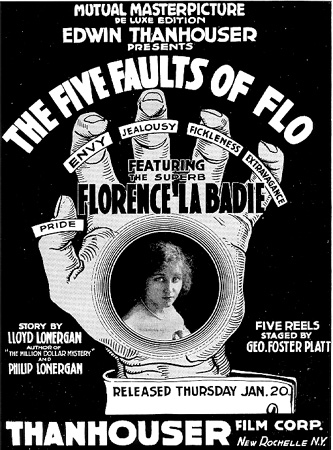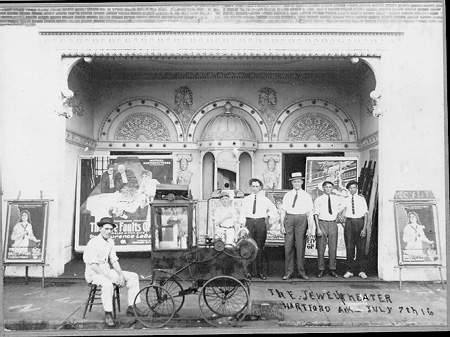 Volume II: Filmography
Volume II: Filmography Volume II: Filmography
Volume II: Filmography


Advertisement from Reel Life (F-900) and the facade of the Jewel Theatre in Hartford, Arkansas, July 7, 1916 showing THE FIVE FAULTS OF FLO.(M-40)
January 20, 1916 (Thursday)
Length: 5 reels
Character: Drama; Mutual Masterpicture, DeLuxe Edition No. 57
Director: George Foster Platt
Scenario: Lloyd and Philip Lonergan
Cast: Florence LaBadie (Flo Forsythe Hale), Harris Gordon (Lincoln Hale, her fiancé, later her husband), Samuel Niblack (reckless millionaire), Ernest Howard (Fletcher Forsythe, Flo's father), Grace DeCarlton (timid little girl), Bertha Smith (society woman), Helen Eldridge (Countess X)
Location: Some exterior shots were filmed in Connecticut.
Note: In terms of publicity received, this was one of Thanhouser's better-known films of the era, for it showcased Florence LaBadie, the firm's most famous actress.
ARTICLE, The Moving Picture World, December 4, 1915:
"George Foster Platt has gone up into Connecticut with a company headed by Florence LaBadie, the pretty Thanhouser star, to take the exteriors of the Thanhouser Mutual Masterpicture, The Five Faults of Flo, which will be released later. Harris Gordon is playing opposite Miss LaBadie in this picture which pictures the five faults of a beautiful girl - one in each reel, being pride, envy, fickleness, extravagance, and jealousy."
SYNOPSIS, Reel Life, January 8, 1916:
"'With all her faults I love her still!' exclaimed some man in a moment of lover's folly, and woman leaped to the conclusion that her faults were the secret of her charm. A striking drama dealing with the views of the gentle sex is offered by the Thanhouser Company for release on January 20th, and it certainly does not put a premium on woman's weaknesses. The Five Faults of Flo is sternly uncompromising in its handling of a subject which has often lent itself to sentimental palaver. It reduces feminine failings to five fundamental moral defects, and shows how one woman was cured of them all. The play is intensely dramatic, much to the point, and extremely well acted.
"Created especially for Miss Florence LaBadie, the beautiful star beloved of photoplaygoers the country over, there is still nothing about Miss LaBadie in private life to suggest the character she assumes on the screen. She is thoughtful for others, gracious, dependable and lovely. But she is sufficiently an artist to make of herself a distinctly disagreeable young person in the film, for the sake of the tremendous message of her play. Flo permits us to share her innermost experiences and the emotions which accompany the change she undergoes from a girl of serious faults to a young woman who, in her husband's eyes, 'is everything sweet and noble.' The story is one of absorbing interest. But the brilliancy, charm and wonderful emotional grip of the production are really due to the fine character work of Miss Labadie.
"Flo overhears Lincoln Hale, her husband, talking with a confidential friend. 'My wife,' he says, 'has no faults. She is, and always has been, everything that is sweet and noble.' The young wife knows that he is mistaken. Slipping away to her own room, she lives over the struggles of her youth to overcome certain serious failings, unknown even to the man she has married. As a girl away at school, Flo had been snobbish and cruel. She was born to be a leader, and had the instinctive contempt of a strong nature for those weaker than herself. Little Amy Rawson easily became her victim. The timid 'new girl' ran away from school one night - and suddenly Flo realized that for Amy's misery and loneliness at Miss Beardsley's she alone was to blame. She followed the girl, and was barely in time to save her from being crushed by a train on a narrow trestle. That harrowing moment cured Flo of false pride.
"After she 'came out,' the debutante, Flo Forsythe, suffered from covetousness. On one occasion, at a week-end party, she had been consumed with envy of her hostess who possessed the famous Ventnor diamond, and she also begrudged the Countess X her striking beauty. But Mrs. DeLacy was frantic with grief when the jewel disappeared, and the next day the 'Countess' was arrested. After that Flo wasted no envy on anybody. While secretly engaged to Lincoln Hale, the society favorite flirted with half a dozen other men. One memorable day she accepted Bertie Berthalon's invitation to motor with him through Westchester. Bertie indulged in too much wine at a roadhouse, and the return trip was a frightful nightmare. Fortunately for Flo, they were overtaken by Hale, and she managed to leap into his car. But the reckless young millionaire dashed over a cliff and was killed. Flo always blamed herself for the tragedy. This dreadful experience transformed the vain coquette into the devoted fiancée.
"As Fletcher Forsythe's pampered and only daughter, Flo was extravagant. As last Forsythe's appeal to a wealthy older brother was curtly refused, and the murder of the brother that same night appeared suspiciously like Fletcher Forsythe's doing. Flo's father was seized and tried for fratricide. Though his daughter sold everything they had to raise funds for his defense, Forsythe was sentenced to die. At the eleventh hour, with her lover's help, Flo saved her father. These bitter events taught her how a woman's ignorant extravagance may wreck the lives of those who love her. Not long after she was married, Flo read a letter to her husband from Stella Riccardo, the proprietress of a notorious gambling resort. Flo could not know that the 'old scores' to which Stella referred were not Lincoln's debts, but obligations of her ne'er-do-well brother's. More, she misinterpreted the missive as a love note. That night she disarmed of her wifely suspicions, she contrived to save both her husband and herself from a sudden police raid and most unwelcome public scandal. Flo was cured then of her last fault, jealousy. 'And now,' she whispers to herself, 'I am going to be, always, all that he believes me to be.'"
REVIEW, The Moving Picture World, January 15, 1916:
"The scenario for this production was written by the Lonergan brothers, Lloyd and Phil. The idea is quite a clever one, and the lesson, or lessons, contained in the picture are such as might well be remembered."
REVIEW by Louis Reeves Harrison, The Moving Picture World, January 15, 1916: This review is reprinted in the narrative section of the present work.
# # #
Copyright © 1995 Q. David Bowers. All Rights Reserved.